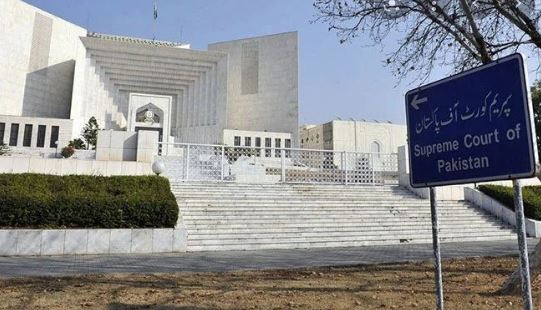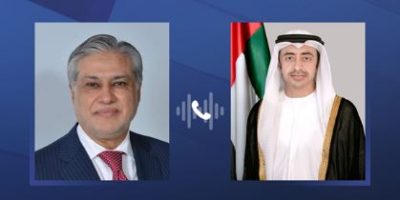SC adjourns hearing on Presidential reference seeking interpretation of Article 63-A

ISLAMABAD, Mar 28: The Supreme Court on Monday adjourned hearing on Presidential reference seeking its opinion on Article 63-A of the Constitution till Tuesday.
A five-member larger bench of the apex court headed by Chief Justic Umar Ata Bandial and comprising Justice Ijaz Ul Ahsan, Justice Muneeb Akhtar, Justice Mazhar Alam Khan Miankhel and Justice Jamal Khan Mandokhel heard the Presidential reference and and a petition filed by Supreme Court Bar Association (SCBA) against public gatherings of the Opposition and the government in the federal capital ahead of the no-confidence motion.
The Advocate General Sindh said that the position of Sindh government was not being included in the First information Report (FIR). Upon this, the Chief Justice said that the court had an extraordinary hearing on the Sindh House incident. He advised the AG Sundh to contact the relevant forum.
According to the Sindh government the attack on Sindh House was a terrorist act and demanded that terrorism clauses should be included in the FIR, he added. He directed the federal government to proceed on FIR according to the law. The Sindh government could approach the Sessions Court, he added.
Attorney General for Pakistan Tariq Jawed Khan while continuing his arguments on Presidential reference said that he wanted to refer a 2018 verdict of the apex court in which the SC had asked all candidates to submit an affidavit along with nomination papers.
He said that the court had declared that nomination papers without the affidavit would be incomplete.
There was no requirement of an affidavit in the law and it was submitted on orders of the court. He said that the court had said in the verdict that the move was aimed at ensuring transparency in the election process. Justice Mandokhel asked the attorney general whether he believed there was something missing in Article 63-A.
The AGP replied that the article in question could not be read alone. Talking about that the Supreme Court’s 2018 verdict earlier mentioned by the attorney general, the Chief Justice said that it talked about the credibility and sanctity of the elections. The AGP said that a five-member bench of the Supreme Court had referred to Articles 62 and 63 to maintain transparency. He said that members of political parties were bound by party discipline. Justice Ijaz Ul Ahsan remarked that Article 63-A was related to de-seating.
He asked how it could be linked with lifetime disqualification. He said that different forums were available to take action against those who changed loyalties. Linking Article 63-A to lifetime disqualification was merely a hypothesis, he added. The Attorney General said that the lifetime disqualification clause was applicable where malafide intention was involved. Upon this, Justice Ijaz remarked that the question was what dishonesty was committed and against whom.
The Attorney General argued that there were three players including voter, the party and the member who was elected in the entire process. The member who won on the party’s ticket promised to follow the party’s mandate, he added. Justice Jamal Khan Mandokhel asked whether there was a punishment for resigning? The AGP responded that only resignation was not the problem.
Justice Mandokhel asked the AGP to limit his arguments to the presidential reference. He asked was de-seating under Article 63-A not enough? He said that members would have to face the consequences of violating the party policy. The Article 63-A stated that the parliamentary membership of the MNA would be terminated, he added. Chief Justice Bandial said that the government wanted to determine the period of disqualification. Disqualification under Article 62 (1)(f) required a verdict, he added. The Chief Justice asked whether an MNA could be disqualified for up to five years under Article 63-A. Justice Ijaz asked how Articles 63-A and 62 (1)(f) could be linked.
He asked was not it necessary to prove taking bribes on a forum. He said that Article 62 (1)(f) was applicable on taking bribes. The Attorney General replied that violation of Article 63-A was legally mala fide. Upon This, the chief justice asked the AGP whether a lawmaker could be disqualified for three years or five years under Article 63-A or if it was temporary. He asked the AGP whether he was seeking lifetime disqualification for political dishonesty? Justice Muneeb Akhtar said that both the constitutional provision of lifetime disqualification and Article 63 were different.
He said that lifetime disqualification was related to false information and statements in nomination papers. Action against a dissident member was a matter for after election, he added. Justice Muneeb Akhtar said that the verdict the AGP was referring to was related to pre-election matters. He asked how it could be applied post-election. The Attorney General replied that election laws could not be above the Constitution. Justice Mandokhel said that the Election Commission of Pakistan (ECP) was present to take action against a dissident member. He said the ECP should be allowed to decide the matter once the party’s head submitted a declaration.
He asked when the procedure had been clarified in the law, what did the government wanted? If the Election Commission’s decision was challenged in the Supreme Court, then the court would see, he added. He asked how the length of disqualification would be decided. Justice Muneeb Akhtar said the matter was very complex and the entire constitutional framework would have to be evaluated. The chief justice asked how the prime minister could take a vote of confidence from the parliament if 15 to 20 lawmakers were de-seated.
He asked could the prime minister stay even with a reduced majority The Attorney General replied that the president could direct the prime minister to take a vote of confidence. Justice Mandokhel said if the demand for action against dissident lawmakers was not made by all political parties, then the matter should be resolved in parliament. Justice Ijaz said that a lawmakers switching loyalties to change a government at any time was a joke.
The Chief Justice said that even if a member was de-seated and the no-confidence motion against the prime minister was unsuccessful, the ruling party still lost the majority. The AGP replied that there was a separate procedure if that was the case. Justice Muneeb Akhtar said that the article related to lifetime disqualification was applicable when a member hid information in his nomination papers.
He asked how a lawmaker could be disqualified for life without misconduct proceedings being initiated against him. Justice Mazhar Alam Khan Miankhel asked how the government would decide the length of disqualification. The AGP responded that because of that reason, the government had approached the apex court. Justice Miankhel asked the AGP whether he thought that the interpretation of Article 63-A was very clear.
He asked the AGP whether he did not consider that the interpretation on questions raised in the Presidential reference was not required? The Chief Justice said that the question was why politicians, who got the opportunity at different times, did not decide the length of disqualification of dissident members. Politicians had clear majority since 1997, he added. He asked why was the length of disqualification not decided then? He said that democracy was an important part of the Constitution and the parliament was supreme.
Related News

Dar extends sympathy to UAE over torrential rains devastation
ISLAMABAD, APR 24: /DNA/ – Foreign Minister of Pakistan, Ishaq Dar held telephone conversation withRead More

PTI blasts FO for silence over US warning of imposing sanctions for doing business with Iran
Govt should issue befitting, solid response to US administration threatening statement ISLAMABAD: /DNA/ – PakistanRead More


Comments are Closed